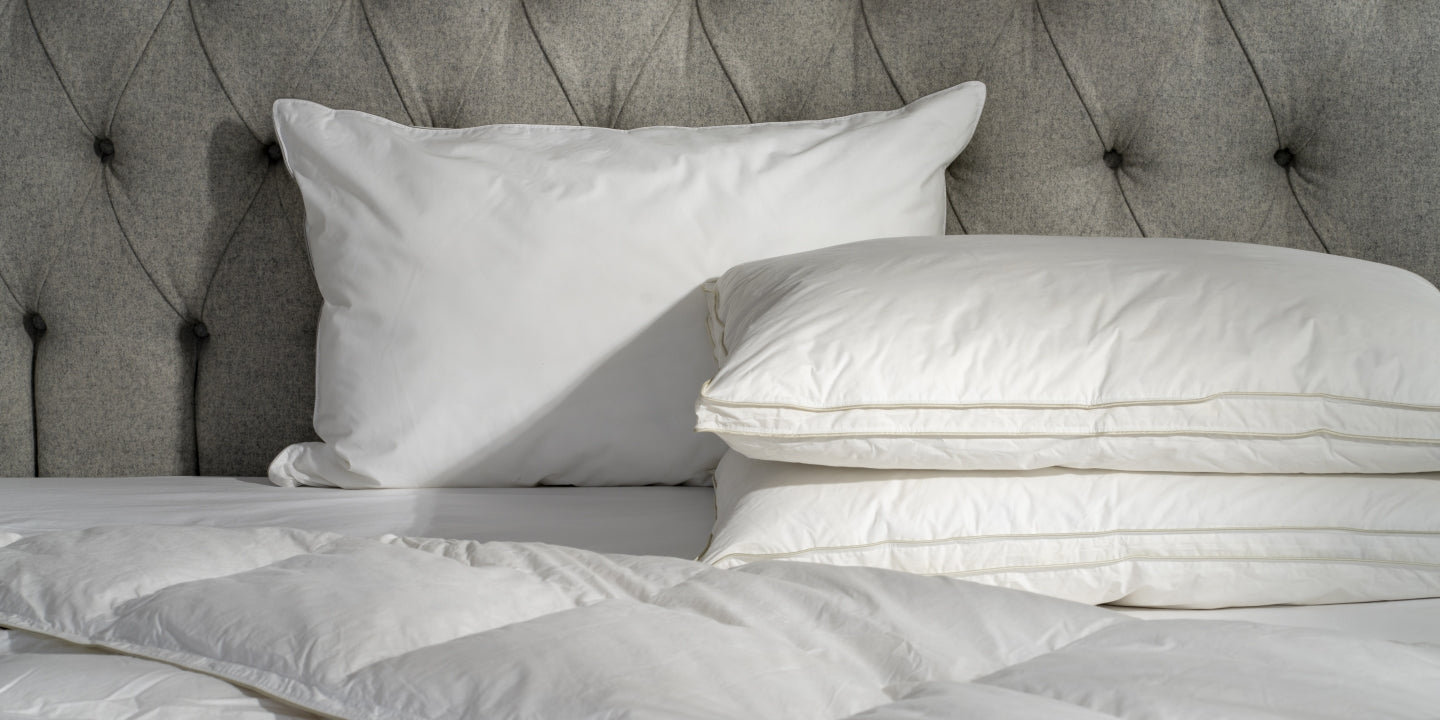How often should you change your bedding?
Replacing your bedding is an important way of keeping your bed hygienically clean which is beneficial for the health of you and your bed. But how often should you replace your bedding? Waiting until the day things start falling apart is too long, but it’s not good for the environment or your bank account to replace too frequently. Here’s the lowdown on when it’s time to replace key pieces of bedding.
How often should you replace your mattress?
Official guidance is that you should be replacing your mattress after about 8 years. But because not all mattresses are created or treated equally, it really depends on the individual condition of your mattress. Your mattress’s age is less important than how it feels, looks and (sorry!) smells. Some of the signs that it’s time to replace your mattress include:
-
Springs digging into your body when you lie on the bed.
-
A dip in the centre of the mattress which means you can’t help but roll down into it when you go to bed.
-
Ripped, threadbare or discoloured fabric.
-
Mildew or other signs of damp and mould on your mattress.
-
An unpleasant smell that airing for a few hours doesn’t solve.
-
An increase in allergies or aches and pains.
-
Noticing how much better you slept at a friend’s house or in a hotel.
Although a new mattress is an investment, replacing an exhausted mattress can transform the way you feel. With better sleep each night, you’ll feel brighter, have more energy and suffer fewer aches and pains.
How often should you replace your duvet?
Cared for well, a duvet will last for anywhere upwards of two to five years. How long your duvet lasts depends on what it’s made with, how it’s been made and how you care for it. Just as with your mattress, it’s more important to examine your duvet’s condition instead of focusing on how old it is. If you notice the following signs, it’s time to treat yourself to a new duvet.
-
The fill is stiff, lumpy or uneven.
-
The casing is ripped, stained or damaged in some other way.
-
It has a smell that washing doesn’t fix.
-
You slept at a friend’s house or in a hotel and noticed how much more comfortable the duvet was.
Replacing your duvet will not only make you feel more comfortable as you nod off to sleep, but it may also help reduce allergic symptoms. That’s because an older duvet may well have a build-up of bacteria and other allergens that can leave us feeling less than perky in the mornings.
How often should you replace your pillows?
Pillows go through a lot. Not only do they have the weight of our heads on them all night, but they also take the brunt of the moisture that we breathe out as we sleep, as well as a build-up of oils from our heads, skin and products we use. For this reason, experts recommend that we replace our pillows every 1 to 2 years. This not only means a more comfortable night’s sleep with better neck and shoulder support, but is important for your health too. The build-up of moisture and oils in a pillow creates the perfect breeding ground for bacteria and allergens – and who wants to share a bed with those?
How often should you replace your bed sheets?
Because bed sheets should be regularly laundered (at least fortnightly), there’s less urgency to replace them with the same frequency as other pieces of bedding. Although some people may claim you need to replace them every 1-2 years, there’s no need to do this unless you want to, and with good care, you shouldn’t need to.
Keep your bed sheets clean, store them well, and you can use them for far longer than just two years. This does, of course, depend on whether you rotate your bed sheets. If you use the same bed sheet week in, week out, then it will need to be replaced sooner than if it’s one of two or three that you rotate each laundry day. Of course, if you notice your bed sheets are thinning or have stains that won’t shift, then it’s probably time to invest in some new bed sheets.
Choosing the best eco-friendly bedding
Because sustainability isn’t just about what we do with products at the end of their life, it’s also important to think about what you choose to buy initially. Choosing durable, responsibly made bedding is just as important. With the Soak&Sleep Made To Last Guarantee, you can rest assured your bedding will last the test of time with the right care.
How to make your bedding last longer
One of the easiest things we can all do to be more environmentally friendly is to make the products we already have last longer. Care for your bedding well and it will last you for many years – something that benefits both you and the environment. Here are a few ways to make your bedding last longer:
-
Protect your bedding. Using duvet, pillow and mattress protectors will keep your bedding fresher and cleaner for longer so that it lasts longer.
-
Air your bed. Pulling back the covers when you first get out of bed is an easy way to make your bedding last longer. Doing so helps the moisture that’s built-up in your bed overnight to evaporate. This, in turn, helps keep your bed clean, fresh and allergen-free. Give your mattress, pillows and duvet another airing when you change the sheets – strip your bed completely and leave it without any bedding for a while to freshen it up some more. Airing your mattress and pillows outside when it’s sunny is another great way to freshen things up.
-
Turn your mattress regularly. This helps ensure the fillings are distributed evenly and that you use each side of the mattress. By doing this, you’ll help your mattress last for longer.
-
Launder your bedding when necessary. Keeping things clean will help your bedding last for longer. We’d recommend you use professional capacity washers and dryers for your duvets, toppers and pillows to keep them at their best. And always make sure the fillings are bone dry before using your duvet and pillow. If not, the fillings will clump and your duvet or pillow will be unusable.
Use the right detergents. Washing your bedding with the wrong products can damage them in the long term. Check the labels and follow the wash-care advice. It’s especially important to avoid using fabric bleach as this can damage the fibres in your bedding, especially with bedding that includes hemp, linen, wool or silk.






